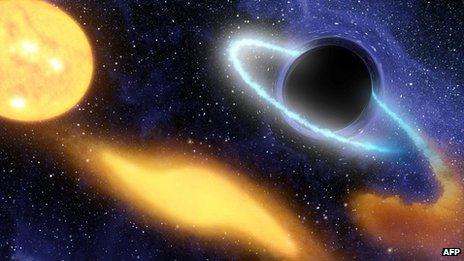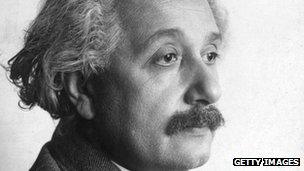Black hole collision research could also test Einstein
- Published

An artist's concept shows a supermassive black hole at the centre of a remote galaxy digesting the remnants of a star
A team of 20 leading physicists are trying to predict what happens when two black holes collide.
The group is led by Dr Mark Hannam from Cardiff University, who hopes the work could "push open a new window on the universe" and its "dark side".
The team believe their findings could even test Einstein's theory of relativity.
They will use super-computers to help predict where in the universe black holes are most likely to collide.
Models will be constructed with up to one thousand billion calculations (1,000,000,000,000) every second.
Black holes are former stars whose vast mass has caused them to collapse in on themselves.
They become so dense that their gravitational pull sucks in everything around them, including light and radio waves, making them virtually undetectable from Earth.
Astronomers are only aware of the existence of black holes by observing their effect on nearby bodies, and by applying the principles of Albert Einstein's theory of general relativity.
The project aims to use super-computers to prove the existence of gravitational waves - similar to ripples in a pond - which Einstein theorised should be emitted by black holes, when their vast gravitational field sucks in neighbouring planets and stars.
Yet because waves of gravitational radiation are much weaker than electromagnetic sources, such as light and radio waves, they have never yet been detected by scientists.
If Einstein's theory is correct, then these gravitational waves should be strongest when two black holes collide, sucking each other in, to form a super black hole with the mass of millions of stars but just a fraction of the size.
"It is electromagnetic waves that have told us everything we have learnt about the cosmos since ancient times," said Dr Hannam from Cardiff University's school of physics and astronomy.
"If we could also detect gravitational waves, that would push open a new window on the universe and tell us about its `dark side'."
'Fantastic boost'
"Over the past decade a network of gravitational wave detectors has been built, including the US Laser Interferometer Gravitational-Wave Observatory, or Ligo, and the European GEO600 and Virgo detectors, with the ambitious goal of not only making the first direct detection of the gravitational waves, but also to observe the entire universe through gravitational radiation."
But Dr Hannam's team hope to give the existing observatories a helping hand, by using computer modelling to predict where in the universe black holes will be most likely to collide.
Until last year, such a calculation was beyond the power of any computer yet devised.

Nobel prize winner Albert Einstein's theories of gravity and relativity will be tested by the research
However, by networking three of Europe's most powerful super computers in France and Germany, the team now have access to 1 petaflop of processing power, around a million times more powerful than a domestic computer.
"The gravitational wave detectors are pushing against the limits of current technology, and now we will help them with simulations that are at the cutting edge of computing power.
"Access to such vast computing resources is a fantastic boost for scientific research in Wales," Dr Hannam added.
It is hoped that the computer modelling may also help to shed light on the existence or otherwise of "naked singularities".
Some visible objects in space appear to have the density of a black hole, yet light is somehow able to escape from them.
If the super computers confirm the theoretical possibility of naked singularities, then it could be a blow for general relativity as Einstein explained it but a huge leap forward in our understanding of the universe.
Dr Hannam said: "The team hope to be able to test if Einstein's theory of gravity is correct, or whether, just as Newton's gravity gave way to Einstein's, perhaps Einstein's relativity gives way to even deeper insights into the nature of space and time".
- Published3 October 2011
- Published12 August 2011